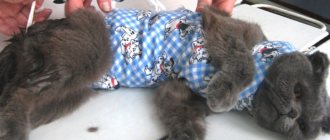Cat owners have different visions for the future of their pet; many plan to undergo surgery to castrate the animal at a certain age. When a cat starts to get excited, wants a cat, or yells, this creates a lot of problems for the family and disrupts peace and relaxation. And the pet itself experiences discomfort.
If no offspring are planned, castration becomes one of the most effective methods for calming the animal. But does it always give the desired result? Sometimes cat owners complain that even after the operation, a neutered cat feels agitated and pesters its owner.
What could be the reason for this behavior, how can I help the cat?
Features of the operation
This operation is common; many cat owners resort to it. After surgery, some changes cannot but occur in the animal’s body. But they are not dangerous to his health. And castration is of great importance, especially for domestic cats.
When a cat periodically tramples and gets excited, screaming loudly at night from his desire, this creates a tense atmosphere in the house. What should owners do in such a situation? As a result, no one brings such a cat a cat anyway, and peace in the family is disrupted for many days.
ATTENTION! The operation, if performed by a good veterinarian, is not dangerous, is carried out quickly, and the recovery time is not long.
The main thing is to properly prepare your pet for surgery and closely monitor it during the recovery period. Castration does no more harm than those hormonal and other pills that would have to be given to an overexcited animal.
The essence of the operation is that the doctor, after making small incisions near the scrotum, will completely remove the testicles or just tighten the seminal canals. Sterilization of cats is a more serious procedure that requires longer rehabilitation, because the cat’s entire uterus is removed.
Does the character of the operated cat change?
Not all owners decide to castrate their animal, but veterinarians convince that the procedure will only be beneficial. It reduces the risk of many diseases that can threaten not only the health but also the life of the pet, and also has a positive effect on its character. In 60% of cases, the animal becomes more docile and good-natured. However, if a cat older than 14 months is subjected to manipulation, by this time his character will have already been formed, and the changes will be minimal.
When a male of the opposite sex becomes indifferent, he pays more attention to his owners and shows tenderness. Some individuals behave overly aggressively, and castration is the only way to get rid of this. Pets undergoing the procedure become more collected, remember commands well and understand what the owner requires of them. They do not want to run away from home and are calmer around other cats. Surgery to remove the testicles is necessary if the family decides to take another pet into the house - they will find a common language from the first days.
The need to mate is an instinct. Cats do not suffer from their own infertility, but they do experience discomfort if their sexual desire is not satisfied. You shouldn’t be afraid of castration or worry about your pet’s self-esteem.
Source
Why does he still want a cat after castration?
When cat owners decide to castrate their pet, they expect that the operation will be easy, everything will heal quickly, and long-awaited peace will come to the house. But time passes after visiting the surgeon, the cat was castrated, and he still screams? What's the problem now?
The cat’s owners get upset and don’t know what to do next, how to calm the animal, which again begins to trample and scream. The reason for this behavior may be a violation of the castration deadlines:
- The cat should be taken to a veterinary clinic to see a surgeon for castration before he has his first relationship with the cat. If mating has already taken place, the operation, if it produces results, will obviously not be immediate . A cat that has experienced the pleasure of an intimate date with a cat will continue to produce hormones after castration.
- Owners may notice a boner on a neutered cat; he will mark his territory and yell at night. The pituitary gland continues to transmit signals, and the pet will experience strong excitement. It is important to listen to the recommendations of veterinarians. Including the timing of castration. You need to be patient, after a long time the situation should return to normal.
- The reason for further agitation of the cat may be unsuccessful or incorrect execution of the castration operation . If the veterinarian is inexperienced or illiterate, he may perform a careless surgical intervention that will not give the expected result. In this case, it is important that such an unprofessional procedure does not also become a threat to the cat’s health.
- In many cats, one testis may be located in the abdominal cavity or under the skin. To bandage it, you have to do strip surgery. This phenomenon is called cryptorchidism. An inexperienced veterinarian may not identify this feature of the pet. This once again proves how important it is to choose a specialist correctly for your pet, and to perform operations only in a clinic, and not at home.
- The cat needs to be given time so that he can recover from the operation so that his body begins to work in a new way. When, after a few days, the owners see that the cat’s penis is erect and that he is trampling on a toy, they are immediately horrified, expecting an immediate result of castration.
- The veterinarian who performed the procedure must warn the animal’s owners that the hormonal levels will not decrease immediately; the cat may remain agitated for some time. You should be patient and not irritate yourself or your pet. Sometimes it takes up to a month to rebuild the body, sometimes this period extends longer.
- When the veterinarian simply ties the vas deferens, this simply blocks the release of sperm . But the cat remains a male with all the attendant behavioral characteristics. He will run after the cats, pester the owner, and trample. You need to check with a specialist exactly what kind of surgery is being performed. In this case, the operation is called a vasectomy, it preserves the level of hormones and all the instincts of the cat.
After complete castration, the hormonal levels decrease gradually, you should wait for the result and do not rush to make claims to the surgeon.
Over time, sexual arousal will decrease and occur less frequently.
ATTENTION! If the operation is performed correctly, by a good specialist, the result will definitely be visible.
How should the behavior of a castrated animal change?
Owners of cats are often interested in what changes occur in the behavior of males after the procedure? Veterinarians call for castration as a way to make the animal more docile and save it from the torment associated with the inability to realize one of its main instincts. Changes in behavior will appear within a period of up to six months:
- the cat stops marking its territory;
- manifestations of aggression towards people and animals are reduced;
- the cat's meowing and searches stop;
- the pet becomes more playful;
- the animal becomes obedient.
After castration, the pet becomes apathetic for a while. It takes up to 5–7 days for him to resume activity. If a kitten was castrated before the first intimate contact, its behavior will not change subsequently - it will remain the same playful teenager. In an animal older than a year, the level of hormones drops gradually, so the cat’s habits will change over the course of 1–6 months.
Over time, the animal loses the desire to secure a certain territory. Males lacking testicles lose their possessive instincts, show less aggression and fight less often with other animals. They lose the desire to wander around the surrounding area, since they no longer need to conquer territory from competitors.
It is worth remembering that surgery is very stressful for a cat. Some affectionate and docile animals become aggressive in the first days or weeks. However, then the pet's behavior will change for the better.
What to consider
- A cat should be neutered before it has the opportunity to mate with a cat.
- You need to think carefully about whether such an operation is really necessary, whether there will be a desire to get offspring from a cat of one breed or another.
- If you decide to undergo castration, it is important to carefully choose a clinic and a doctor. The operation is not complicated and common, but it is still a surgical intervention on the body. It should not be done at home.
- After the procedure, you need to help the cat cope with the condition . You need to be near him as much as possible, if only to calm him down.
- The result of castration may not appear immediately; you need to wait several weeks, sometimes more. Hormonal levels will gradually decrease, and sexual arousal will occur less and less often.
In some cats, sex hormones, testosterone, can be produced in small quantities by the adrenal glands. The amount is really small, but it is enough to excite. What to do in this case.
If the cat does not bother you too much, you can endure some periods. When your pet screams loudly or constantly pesters you, you should give him one of the sedatives specially designed for animals. For example, “Cat Bayun”, known to many cat lovers.
Recommendations for owners
If a cat asks for a cat after castration and continues to actively mark its territory, the owner should consult a veterinarian. Most likely, the doctor will recommend sedatives and possibly hormonal medications. This will help calm the pet and correct its behavior. You cannot select medications on your own.
You can try to distract a cat that is interested in the neighbor cats with a favorite treat, an interesting activity or a toy. A neutered cat who continues to trample cats should be given the opportunity to sharpen his claws. This is an important point that helps the animal mark its territory, maintain its high status and simply relieve stress.
In general, an undesirable style of behavior can manifest itself not only in setting on things, but sometimes on other cats. Animals often rub too hard against their owner’s hands or objects. It is better to stop such manifestations at the very beginning, but not by punishment, but by providing an alternative to get rid of accumulated energy. Interactive toys, such as a soft mouse or a ball, will help here.
When petting a cat, you should avoid overstimulating it. It is worth choosing those areas on the body that promote relaxation, stopping caresses when signs of arousal appear.
Types of procedures
IMPORTANT! Surgical removal of the testicles or ligation of the seminal ducts is not the only way to solve the problem of an agitated and screaming cat.
Modern technologies in medicine make it possible to solve the issue in other ways:
- Chemical sterilization can be carried out. During this procedure, a special substance consisting of sclerotizing agents is introduced into the thickness of the testes. They lead to the testicle being completely replaced by connective tissue.
- Another modern method is drug sterilization. In this procedure, an implant with a drug that suppresses libido is sewn under the cat's skin. This method does not yet have a clear positive assessment, since the reaction of animals to hormonal drugs may be different.
- Some experts also talk about the possibility of an oncological threat . The positive aspect of medical sterilization is that the implant can be removed, the cat’s testicles are not damaged, he can again become a full-fledged male and have offspring.
- Veterinarians may also offer radiation castration. It sounds scary, but, in fact, the procedure is not dangerous and has no consequences. The testes are simply irradiated with a precisely targeted beam of gamma rays, causing their tissue to die. The likelihood of side effects is minimal, the procedure can be performed without anesthesia, and it is not painful.
With such sterilization, the cat must be restrained as securely as possible; if it twitches, the beam of rays will hit the internal organs, and this is extremely dangerous.
Medical sterilization does not always have an effect; it does not suppress the production of hormones by 100%. If the cat is still interested in cats, you need to ask the veterinarian to change the drug. After all, the body of animals is individual, and it often takes a long time to select the substance that can really help.
Despite the fact that surgical castration, the removal of the testicles, is a real operation and a trauma for the animal, this method is considered the most effective. Therefore, veterinarians often advise resorting to this method. The cat will survive the intervention, recover, and over time the operation will give the desired result.
Trust in the owner
Many cat lovers adhere to the version that this is how the animal expresses its gratitude and love for its owner. This is how they show that they are extremely satisfied. The roots of this habit should be sought in distant childhood: kittens, when they settle on their mother’s belly, alternately move their paws, stimulating the receptors responsible for lactation. So this same action, transferred to adulthood, shows the pacification of the animal.
Scientists call this behavior the “milk step.” It is fixed in animals for life, and they crush not only humans with their paws, but even soft toys and other cats during games.
Important! Only if the cat completely trusts its owner will it knead him with its paws, while purring enthusiastically and strongly. These animals do not behave this way with unfamiliar people and unpleasant representatives of the human tribe.
Of course, the claws released during this game can scratch your skin, but still you shouldn’t scold the cat for this: this is how he expresses his deepest devotion and affection for you, at the same time feeling like a little kitten, protected from all the vicissitudes of fate by his mother.
Emotional component
All this is good, but why do pets from time to time begin to “knead” the sofa with their paws with such frenzy that one cannot suspect echoes of a happy childhood in this habit? It's simple. Just like humans, pets are susceptible to stress.
They didn’t give you food on time, your favorite toy disappeared somewhere, the owner didn’t let you sharpen your claws on his favorite leather sofa... There can be many reasons, but there is only one relief - to stomp around in one place, splashing out your emotions. After such a procedure, the animal often becomes much calmer and can even go to make peace with the owner, even if he offended his cat.
Interesting fact. Some animals get so carried away by petting that they not only lose control of their claws, but can even bite and literally kiss their owner. Some breeders complain that their face is completely covered in cat drool.
"Endorphin Junkies"
Oddly enough, while trampling, a cat’s body produces a large amount of endorphin. This hormone promotes a relaxed, complacent state and is a natural stress reliever. Simply put, in this simple way the animal calms down and returns to normal. You have probably seen more than once how a cat, being almost asleep, continues to automatically “stomp” on the sofa or pillow.
If she is not yet sleeping, she often licks herself, paying special attention to the same pads on her paws. This is how the animal produces increased stimulation of endorphin production. Haven’t you noticed how after such a toilet your pet goes to take a sweet nap? Basically, Mother Nature has blessed these miniature predators with a built-in stress and fatigue reliever. Such a mechanism would clearly not harm a person!











